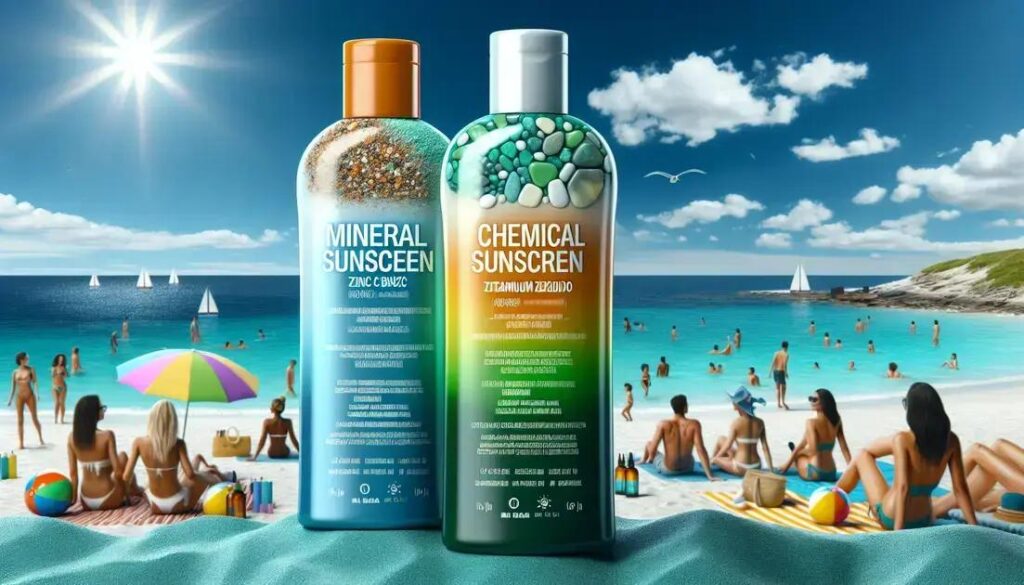Hey there, sunshine lovers! 🌞 If you’ve ever stood in the sunscreen aisle, scratching your head and wondering, ‘What’s the difference between mineral and chemical sunscreen?’, you’re definitely not alone. With so many options out there, it can feel super overwhelming trying to choose the right one for your skin. But don’t worry, I’ve got your back! In this blog post, we’re diving deep into the world of sunscreens, breaking down the differences between mineral and chemical options, and helping you figure out which might be the best fit for you. Whether you’re hitting the beach, going for a hike, or just running errands, knowing what you’re putting on your skin is crucial. So, grab a cup of coffee, get comfy, and let’s get into it! ☕
By the end of this post, you’ll have a clear understanding of how these two types of sunscreens work, their pros and cons, and some tips to help you make the best choice for your skin type and lifestyle. And hey, if you’re as passionate about skincare as I am, you’ll definitely want to stick around. So, let’s jump right in and uncover the secrets behind these sun-blocking superheroes! 🌟
Understanding Sunscreen Basics
What is Sunscreen and Why Do We Need It?
Sunscreen is like your skin’s best friend, protecting it from the harmful UV rays of the sun. These rays can cause sunburn, premature aging, and even skin cancer. So, slathering on some sunscreen is a must, even on cloudy days!
Types of Sunscreens: An Overview
There are two main types of sunscreens: mineral (also known as physical) and chemical. Each has its own way of protecting your skin and comes with its own set of benefits and drawbacks.
Mineral Sunscreen: The Natural Protector
How Does Mineral Sunscreen Work?
Mineral sunscreens use natural minerals like zinc oxide or titanium dioxide to create a physical barrier on your skin. They reflect UV rays away from your skin, acting like a shield.
Benefits of Mineral Sunscreen
One of the biggest perks of mineral sunscreen is that it starts working immediately after application. Plus, it’s often recommended for sensitive skin types since it’s less likely to cause irritation.
Drawbacks of Mineral Sunscreen
Mineral sunscreens can sometimes leave a white cast on the skin, which isn’t ideal if you’re trying to avoid the ghostly look. They’re also thicker and can feel heavier on the skin.
Chemical Sunscreen: The Absorbing Agent
How Does Chemical Sunscreen Work?
Chemical sunscreens absorb UV rays using active ingredients like oxybenzone or avobenzone. They convert these rays into heat, which is then released from the skin.
Benefits of Chemical Sunscreen
Chemical sunscreens tend to be lighter and more wearable under makeup. They also don’t leave a white film, making them a popular choice for everyday use.
Drawbacks of Chemical Sunscreen
These sunscreens can sometimes irritate sensitive skin and may not be as eco-friendly. They also need about 20 minutes to start working after application.
Choosing the Right Sunscreen for You
Consider Your Skin Type
If you have sensitive or acne-prone skin, mineral sunscreen might be your best bet. For those with normal or combination skin, chemical options could work well.
Think About Your Daily Routine
If you’re always on the go, a quick-absorbing chemical sunscreen might fit better into your routine. But if you’re spending a day at the beach, mineral sunscreen could offer more immediate protection.
Check the Ingredients
Always read the label! Look for broad-spectrum protection, which means it protects against both UVA and UVB rays. And SPF 30 or higher is generally recommended.
Do I need sunscreen if I have dark skin?
Absolutely! All skin types need protection from UV rays, regardless of melanin levels.
Can I use sunscreen on babies?
It’s best to keep infants under 6 months out of direct sunlight. For older babies, choose a mineral sunscreen.
Is higher SPF always better?
SPF 30 blocks about 97% of UVB rays, while SPF 50 blocks about 98%. Higher SPF provides slightly more protection but isn’t drastically different.
Can I use expired sunscreen?
No, expired sunscreen may not provide adequate protection. Always check expiration dates.
How much sunscreen should I apply?
Use about a nickel-sized amount for your face and a shot glass amount for your body.
So, there you have it, ladies! Whether you choose mineral or chemical sunscreen, the most important thing is to use it consistently. Protecting your skin from the sun is one of the best things you can do for your health and beauty. Remember, sunscreen is your skin’s best friend, so make it a part of your daily routine. If you found this post helpful, share it with your friends or leave a comment below with your favorite sunscreen tips. Stay sun-safe and fabulous! 🌞💖













